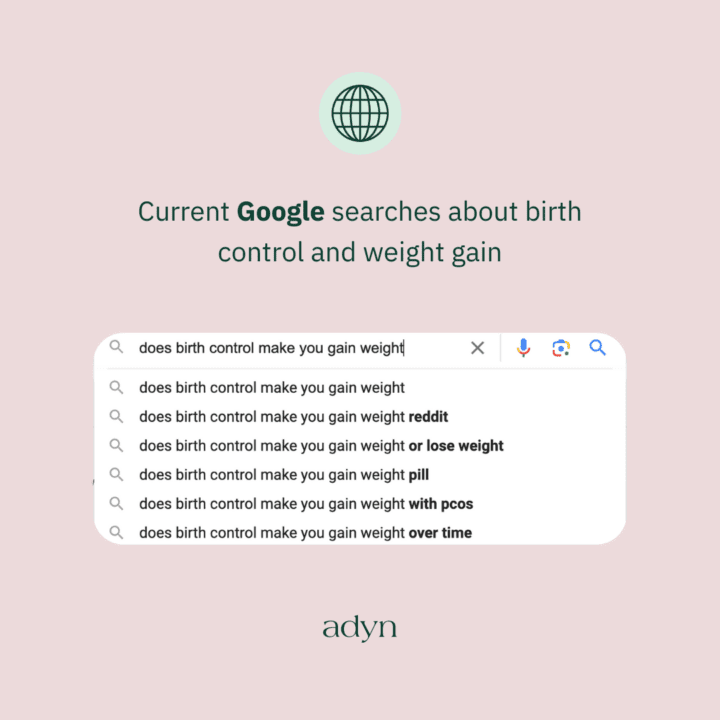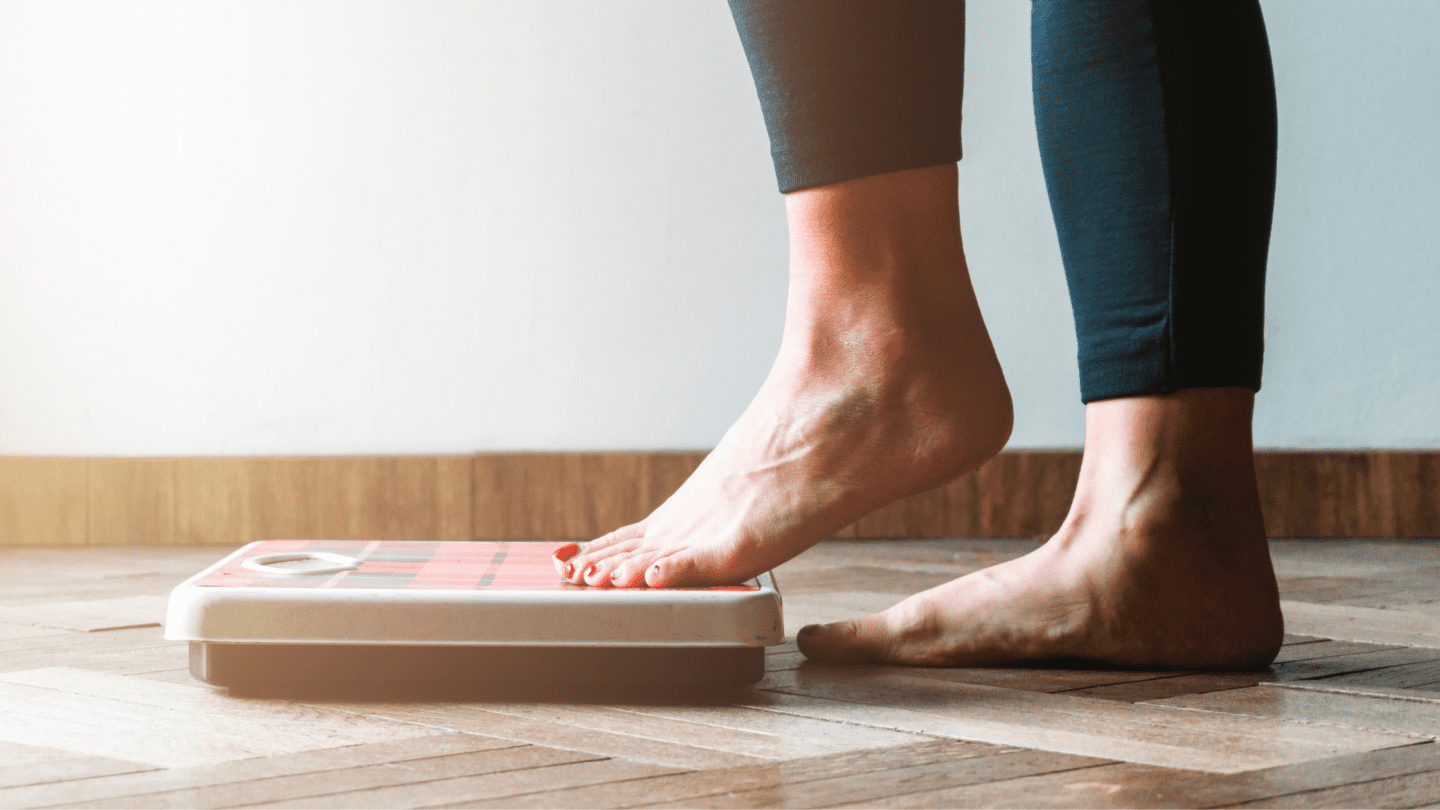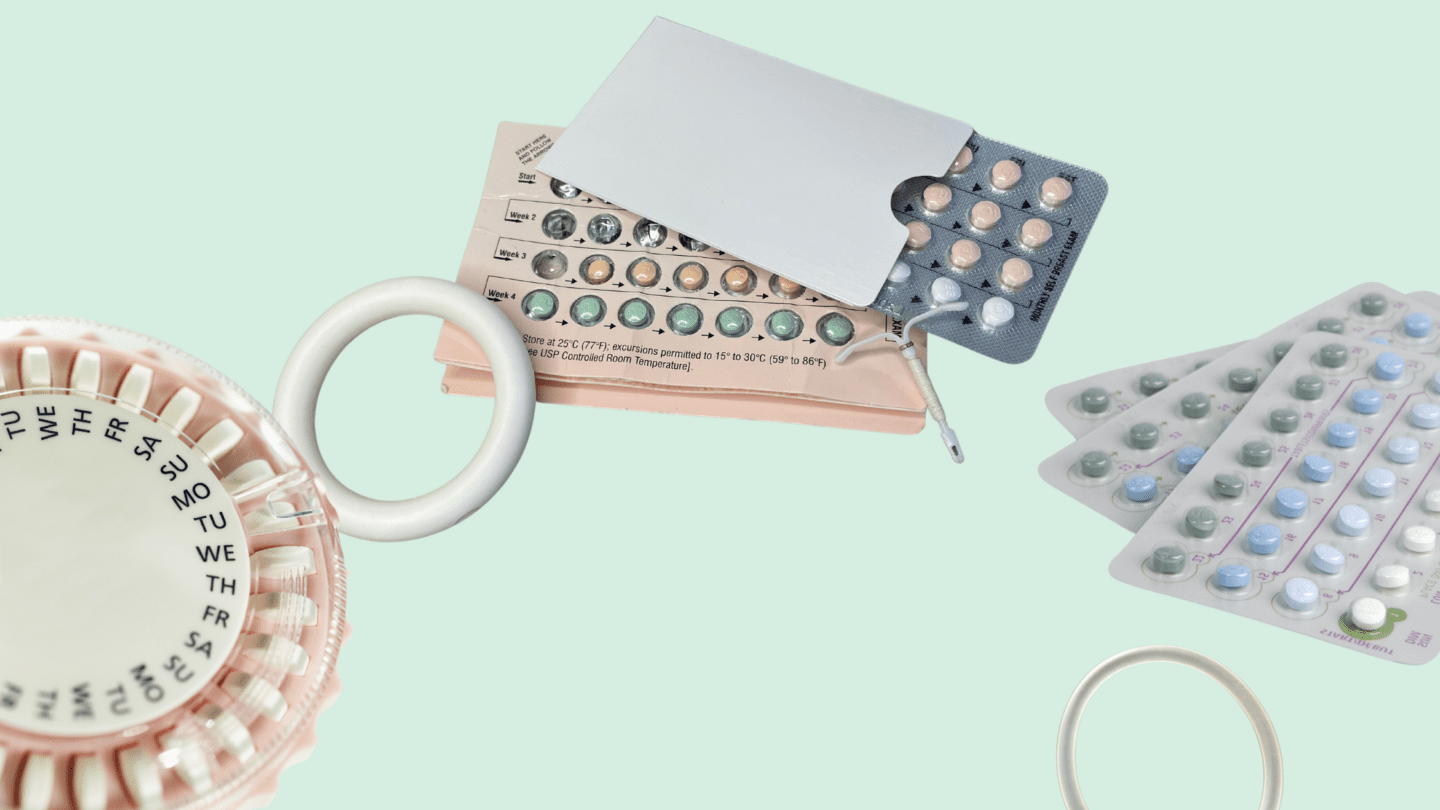All kinds of hormonal can come with side effects, from changes in mood to changes in your bleeding patterns. But one of the most commonly asked (and Googled) questions about is “does cause weight gain?”
It’s a fair question: Some kinds of can change how your body looks and feels. Whether will cause weight gain is one of the most commonly-asked questions about side effects, which is understandable — weight gain is unfortunately a common worry for humans of all shapes and sizes, especially as we age. Thankfully, the question is one that researchers have been studying over the decades.

Currently, the evidence suggests that just two kinds of hormonal birth control, the Depo-Provera shot and the Nexplanon implant, are linked to increases in body weight in some people. All other kinds of , including hormonal types like the pill, IUD, patch, and ring, don’t affect body weight, on average.
The fact that some kinds of can lead to weight gain and others don’t comes down to the kinds of hormones they use, and possibly how those hormones are delivered. Some kinds of contain both and , while some just have . Different s use different kinds of , too, which can affect your body differently. To add even more complexity, everyone’s body will respond to these hormones a little bit differently, so your side effects might not be the same as your friend’s.
Everyone’s body will respond to these hormones a little bit differently, so your side effects might not be the same as your friend’s.
If you are worried your is causing you to gain weight, talk to your doctor. They can help you find a different kind of that you might like better. To learn more about why some kinds of can cause weight gain, read on.
Which causes weight gain?
Scientists have done a number of studies comparing people on different types of and watching to see whether they gain weight or not. The consensus from these studies is that only the shot, also called Depo-Provera, and the implant, sold under the brand name Nexplanon, cause weight gain on average. That still means some people might gain weight on it but not others, but that overall users of the did average higher weights at the end of the studies.
Does Nexplanon cause weight gain?
Nexplanon is a kind of that contains the etonogestrel. This sex prevents ovulation, or the release of an egg, and it’s a highly effective form of .1 It comes as a tiny device inserted under your skin, and you swap it out every four years.
One 1997 study of 56 teenagers using the implant found they gained twice as much weight as those using the pill — 8.7 pounds versus 4.2 pounds, respectively.2 Another small study of 34 participants found that users of both Depo-Provera and Nexplanon gained weight, around 10 pounds on average.3
Does Depo-Provera cause weight gain?
Depo-Provera is a form of that involves getting an injection of the depo medroxyprogesterone acetate every three months. Like Nexplanon, it’s a highly effective form of .4
Multiple studies of Depo-Provera and weight gain show that this kind of can cause weight gain. One study found that users gained an average of 3.5 pounds over the course of four months,5 while another found an average weight gain of around 11 pounds over three years.6
Some people could be more likely than others to gain weight while on the shot, though. One study found that just 48 percent of users reported weight gain,7 while another study suggests that adolescent users of Depo-Provera who are already obese could be more likely to gain weight.8
Like what you’re reading? Get the latest straight to your inbox 💌
A 2016 review of 22 studies on and weight gain concluded that Depo-Provera did lead to weight gain, while there was mixed evidence that other kinds of progestin-only caused weight gain.9 Most of these studies were small, and the authors of the review reported that more than half the studies presented “low quality” evidence. The best takeaway? Depo probably does cause weight gain, but we definitely need some more research on the topic.
Why do some kinds of cause weight gain? Scientists still aren’t totally sure. Some studies speculate that it might come down to neurological side effects — for instance, if some people crave food more when using certain contraceptives. One study looking at MRI scans of people’s brains provides some support for this theory, finding that people on the shot responded more strongly to images of food than people not on the shot.10
Is adyn right for you? Take the quiz.
Other methods and weight gain
Most studies so far say that other methods of hormonal birth control, like the pill, , IUD, and others, don’t cause weight gain. A 2014 review of 49 different studies of combination pills and patches found there was no evidence indicating they caused weight gain, though the authors do note they couldn’t yet draw definitive conclusions.11
Another study comparing hormonal IUDs to the Nexplanon implant in over 36,000 people found IUD users had about 1.5 pounds of weight gain after three years, which is about comparable to normal rates of weight gain.12-13
Why can make you feel like your weight is changing
Though most options don’t affect how much fat your body is holding onto, they can come with some other side effects that might make your body look or feel different. The most obvious side effects when it comes to weight are how can affect water retention. Depending on the kind of , can either cause your body to hold onto or let go of more water than usual, which can cause the number on the scale to fluctuate.
Studies show that can increase how much water your body retains, which can make you feel more bloated than usual.14 Why this happens isn’t totally clear, but it may come down to changes in how your kidneys reabsorb water. Combined options, like the pill, patch, or ring, do often list bloating as a side effect,16-18 though it often tends to go away a few weeks after starting on it.19
On the other hand, some types of s function as diuretics, which means they help your body get rid of water. The drospirenone found in hormonal contraceptives like Yaz and Yasmin has diuretic properties, and might actually cause you to lose weight through water loss.20
There’s also some limited evidence that some kinds of can affect how you put on muscle when you work out. Some kinds have been linked to increases in muscle mass after working out,21 and some kinds are linked to decreases in muscle mass.22 The story isn’t completely clear when it comes to birth control and exercise, but it’s possible that you might end up a little lighter or heavier on because of changes to your muscle mass, especially if you work out a lot.
What to know about and weight gain
Most hormonal contraceptives (and all non-hormonal ones) won’t cause you to put on weight. Even for those that do, the weight can come from things that aren’t fat, like extra water or muscle.
Research suggests that the birth control shot and implant can both cause weight gain, though it doesn’t happen to everyone. The side effects you feel come down to your unique biology and genetics, and could be quite different from those someone else experiences.
When choosing the right for you, there are lots of factors to weigh. The birth control shot and implant are both highly effective forms of , and they don’t need to be swapped out that often, meaning they can offer more peace of mind for some people. Ultimately, the choice of what to use is up to you.
If you don’t like the way your is making you feel, the most important thing to remember is that you have options. You can always switch to another method that might suit your needs better.
Picking the right begins with learning more about your own body. See how The Birth Control Test can get you started today.
-
- FDA Access Data Nexplanon https://www.accessdata.fda.gov/drugsatfda_docs/label/2019/021529s018lbl.pdf
- Berenson AB, Wiemann CM, Rickerr VI, McCombs SL. Contraceptive outcomes among adolescents prescribed Norplant implants versus oral contraceptives after one year of use. Am J Obstet Gynecol. 1997 Mar;176(3):586-92. doi: 10.1016/s0002-9378(97)70552-0. PMID: 9077611. https://www.sciencedirect.com/science/article/abs/pii/S0002937897705520
- Nault AM, Peipert JF, Zhao Q, Madden T, Secura GM. Validity of perceived weight gain in women using long-acting reversible contraception and depot medroxyprogesterone acetate. Am J Obstet Gynecol. 2013 Jan;208(1):48.e1-8. doi: 10.1016/j.ajog.2012.10.876. Epub 2012 Oct 24. PMID: 23103344; PMCID: PMC3974101. https://www.ncbi.nlm.nih.gov/pmc/articles/PMC3974101/
- FDA Access Data Depo Provera: https://www.accessdata.fda.gov/drugsatfda_docs/label/2010/020246s036lbl.pdf
- Zerihun MF, Malik T, Ferede YM, Bekele T, Yeshaw Y. Changes in body weight and blood pressure among women using Depo-Provera injection in Northwest Ethiopia. BMC Res Notes. 2019 Aug 15;12(1):512. doi: 10.1186/s13104-019-4555-y. PMID: 31416486; PMCID: PMC6694638. https://bmcresnotes.biomedcentral.com/articles/10.1186/s13104-019-4555-y#Sec2
- Berenson AB, Rahman M. Changes in weight, total fat, percent body fat, and central-to-peripheral fat ratio associated with injectable and oral contraceptive use. Am J Obstet Gynecol. 2009 Mar;200(3):329.e1-8. doi: 10.1016/j.ajog.2008.12.052. PMID: 19254592; PMCID: PMC2853746. https://www.ncbi.nlm.nih.gov/pmc/articles/PMC2853746/
- Veisi F, Zangeneh M. Comparison of Two Different Injectable Contraceptive Methods: Depo-medroxy Progesterone Acetate (DMPA) and Cyclofem. J Family Reprod Health. 2013 Sep;7(3):109-13. PMID: 24971112; PMCID: PMC4064779. https://www.ncbi.nlm.nih.gov/pmc/articles/PMC4064779/
- Curtis KM, Ravi A, Gaffield ML. Progestogen-only contraceptive use in obese women. Contraception. 2009 Oct;80(4):346-54. doi: 10.1016/j.contraception.2009.04.006. Epub 2009 Jun 10. PMID: 19751857. https://www.contraceptionjournal.org/article/S0010-7824(09)00120-6/fulltext
- Lopez LM, Ramesh S, Chen M, Edelman A, Otterness C, Trussell J, Helmerhorst FM. Progestin-only contraceptives: effects on weight. Cochrane Database Syst Rev. 2016 Aug 28;2016(8):CD008815. doi: 10.1002/14651858.CD008815.pub4. PMID: 27567593; PMCID: PMC5034734.https://www.cochranelibrary.com/cdsr/doi/10.1002/14651858.CD008815.pub4/full
- Basu T, Bao P, Lerner A, Anderson L, Page K, Stanczyk F, Mishell D Jr, Segall-Gutierrez P. The Effect of Depo Medroxyprogesterone Acetate (DMPA) on Cerebral Food Motivation Centers: A Pilot Study using Functional Magnetic Resonance Imaging. Contraception. 2016 Oct;94(4):321-7. doi: 10.1016/j.contraception.2016.04.011. Epub 2016 Apr 27. PMID: 27129935. https://www.contraceptionjournal.org/article/S0010-7824(15)30212-2/fulltext
- Gallo MF, Lopez LM, Grimes DA, Carayon F, Schulz KF, Helmerhorst FM. Combination contraceptives: effects on weight. Cochrane Database Syst Rev. 2014 Jan 29;(1):CD003987. doi: 10.1002/14651858.CD003987.pub5. PMID: 24477630. https://www.cochranelibrary.com/cdsr/doi/10.1002/14651858.CD003987.pub5/pdf/full
- Hattiangadi, Rohan. Weight Gain Associated With LARC Within a Racially Diverse Patient Population. Obstetrics & Gynecology 135():p 102S, May 2020. | DOI: 10.1097/01.AOG.0000664240.60720.f9. https://journals.lww.com/greenjournal/Abstract/2020/05001/Weight_Gain_Associated_With_LARC_Within_a_Racially.355.aspx
- Tucker LA, Parker K. 10-Year Weight Gain in 13,802 US Adults: The Role of Age, Sex, and Race. J Obes. 2022 May 6;2022:7652408. doi: 10.1155/2022/7652408. PMID: 35574515; PMCID: PMC9106499. https://www.ncbi.nlm.nih.gov/pmc/articles/PMC9106499/
- Stachenfeld NS, Keefe DL. Estrogen effects on osmotic regulation of AVP and fluid balance. Am J Physiol Endocrinol Metab. 2002 Oct;283(4):E711-21. doi: 10.1152/ajpendo.00192.2002. PMID: 12217888. https://journals.physiology.org/doi/full/10.1152/ajpendo.00192.2002
- Physiology, Vasopressin. StatPearls. Brian Cuzzo; Sandeep A. Padala; Sarah L. Lappin. https://www.ncbi.nlm.nih.gov/books/NBK526069/
- U.S. Food & Drug Administration (FDA). “Highlights of Prescribing Information: Ortho Evra.” AccessData.FDA.gov (2014 Apr)
- U.S. Food & Drug Administration (FDA). “Highlights of Prescribing Information: NuvaRing.” AccessData.FDA.gov (2013 Oct)
- U.S. Food & Drug Administration (FDA). “Highlights of Prescribing Information: Yasmin.” AccessData.FDA.gov (2022 Apr)
- Mayo Clinic. “Combination birth control pills.” mayoclinic.org (2023 Aug)
- Foidart JM. Added benefits of drospirenone for compliance. Climacteric. 2005 Oct;8 Suppl 3:28-34. doi: 10.1080/13697130500330309. PMID: 16203653. https://pubmed.ncbi.nlm.nih.gov/16203653/
- Dalgaard LB, Dalgas U, Andersen JL, Rossen NB, Møller AB, Stødkilde-Jørgensen H, Jørgensen JO, Kovanen V, Couppé C, Langberg H, Kjær M, Hansen M. Influence of Oral Contraceptive Use on Adaptations to Resistance Training. Front Physiol. 2019 Jul 2;10:824. doi: 10.3389/fphys.2019.00824. PMID: 31312144; PMCID: PMC6614284. https://www.ncbi.nlm.nih.gov/pmc/articles/PMC6614284/
- Riechman SE, Lee CW. Oral Contraceptive Use Impairs Muscle Gains in Young Women. J Strength Cond Res. 2022 Nov 1;36(11):3074-3080. doi: 10.1519/JSC.0000000000004059. Epub 2021 May 14. PMID: 33993156. https://journals.lww.com/nsca-jscr/Citation/2022/11000/Oral_Contraceptive_Use_Impairs_Muscle_Gains_in.12.aspx








